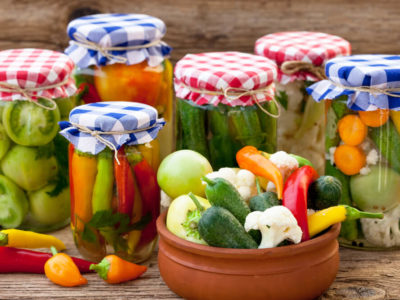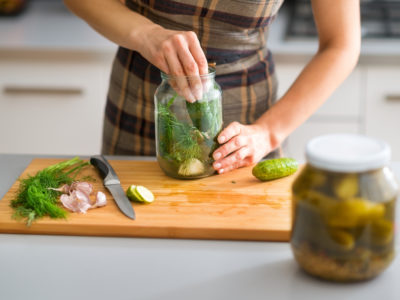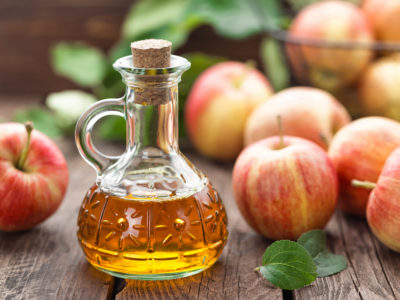Table of Contents[Hide][Show]
You add them to your salads and burgers. Restaurants place them alongside your sandwich. And no hot dog is complete without their sweet relish.
There’s no doubt that crisp, tangy pickles form part of many of your favorite meals.
But are pickles good for you?
Let’s take a closer look at how pickles are made, their fantastic health benefits, possible side effects, and we’ll also share a pickle recipe at the end of this post.
How Pickles Are Made
If you eat pickles at all, you probably already know that they’re made from cucumbers. But how are pickles made?
There are two ways to make pickles.
Brined Pickles
The first method for making pickles is to use brine, a mix of water, vinegar, salt, and spices, to produce their uniquely tangy flavor.
These pickles, often called vinegar pickles, are the ones most commonly found in stores. They’re the best choice for controlling your blood sugar levels.
Fermented Pickles
The second method for making pickles is to allow them to ferment, a much slower process.
During fermentation, yeast, bacteria, and other microbes feed off naturally occurring sugars. This creates a host of “good” or healthy bacteria, which fill the pickles with probiotics—and their health benefits.
For maximum benefits, when you’re buying pickles at your local grocery store, try to find the ones with labels that say “naturally fermented.”
Related
Improve Your Health With Fermented Food
Learn more about the benefits of fermented foods, some do’s and don’ts, and what some of the most popular fermented foods are.
Pickles and Nutrients
They’re tasty, but are pickles good for you? You bet!
While the exact nutritional value differs depending on the exact type and size, pickles are filled with the vitamins and nutrients that your body needs to function properly.
For example, one dill pickle contains:
- 20% of the U.S. Recommended Daily Allowance (USRDA) of vitamin K, which produces the proteins needed for effective blood clotting and building strong bones.
- 6% of the USRDA of calcium, which we need for strong, healthy bones and teeth. Calcium also supports the health of your heart, muscles, and nerves.
- 6% of the USRDA of potassium, which assures the healthy functioning of your cells, regulates your heartbeat, supports your muscles and nerves, and more.
- Between 3% and 4% of the USRDA of vitamin C, a powerful antioxidant that helps protect your cells from free radicals. Vitamin C is also essential in producing collagen, absorbing iron, healing wounds, and maintaining cartilage, bones, and teeth.
- 1% of the USRDA of vitamin A, which your body needs for normal vision, a robust immune system, healthy reproductive organs, and more.
On top of that, pickles are very low in calories, fat, and sugar, making them an excellent choice for snacks or as part of a meal.
Pickles: Health Benefits
Along with being deliciously crunchy, pickles are loaded with health benefits.
Here are just a few of the ways that adding pickles to your diet can benefit you.
Improve Gut Health
Pickles and gut health go hand in hand!
During the fermentation process, pickles are in the perfect environment for beneficial bacteria, known as probiotics, to thrive.
Probiotics are “good” bacteria that are similar or identical to the bacteria already living in your gut microbiome.
When you consume probiotics through food, drinks, or supplements, they add quality, quantity, and diversity to your good gut bacteria. This supports the colonies of beneficial bacteria, helping them thrive, crowding out the “bad” (pathogenic) bacteria, and restoring the right balance to your gut microbiome.
A healthy, happy gut brings an incredible number of positive impacts to your body.
- Improves digestion and absorption of nutrients
- Decreases digestive issues, including diarrhea, constipation, bloating, gas
- Treats or prevents digestive disorders, including Crohn’s disease and Irritable Bowel Syndrome (IBS)
- Reduces inflammation
- Improves skin conditions such as acne and eczema (atopic dermatitis)
- Lowers risk of mood disorders, including anxiety and depression
Related
The Relationship Between Happiness, Your Gut, and Psychobiotics
Find out how the gut-brain connection affects your mood, what psychobiotics are, and how to get more of them so you keep your brain happy.
Boost Immunity
Pickles are incredibly good for boosting your immune system and keeping you healthy.
Remember the beneficial bacteria (probiotics) we mentioned above? They live in your gut microbiome, which, surprisingly, houses about 80% of your immune system. So, a well-balanced gut produces a strong, swift immune response.
In fact, studies show that probiotics, such as those found in pickles, bolster the strength of your immune system so that it’s better able to fight off disease, illnesses, and infections.
Reduce Cell Damage
Like many fruits and vegetables, pickles are also essential to keeping your cells healthy.
Pickles (and the cucumbers they’re made from) contain a powerful antioxidant known as beta-carotene, which protects your body from the damage done by free radicals. This helps lower your chances of developing serious, chronic conditions including heart disease, cancer, respiratory disease, and more.
Recover from Tough Workouts
Pickle juice is a popular recovery tool used by athletes.
For one thing, pickle juice can replenish the electrolytes (salt and other key minerals) you lose when you sweat during a strenuous workout (or even on a really hot day). Along with its high sodium content, it also contains potassium and magnesium, all of which can help you rehydrate.
You don’t even have to drink a lot of it! Just one and a half to three ounces of pickle juice is enough to replace lost electrolytes.
Studies also show that pickle juice can be more effective than water against post-workout muscle cramps. Interestingly, however, it’s not due to the electrolytes.
Instead, research suggests that pickle juice’s cramp-fighting properties stem from the acetic acid, which provokes a reflex in the back of the throat. This reflex can cause muscle relaxation, which reduces the muscle cramps associated with working out.
Keep in mind, though, that pickle juice is high in sodium. Just one three-ounce cup of pickle juice can contain up to 900 mg of sodium, more than a third of the USRDA, depending on the brand.
If you’re watching your sodium intake or eating other high-sodium foods, then you should stick to no more than one small serving per day.
Regulate Blood Sugar
Pickles that are brined with vinegar are also great for controlling your blood glucose levels and avoiding sugar spikes, both of which are critical for anyone with diabetes.
Studies show that healthy adults who consumed vinegar with their meals had lower blood sugar levels.
Regardless of whether you have diabetes or are in a risk group for developing it, minimizing blood sugar spikes is hugely beneficial to your health, reducing the risk of heart disease.
Related
Probiotics for Diabetics: How Your Gut Microbiome Helps Maintain Healthy Blood Sugar
Probiotics for diabetics can make a big impact in managing and even preventing this disease. Learn how probiotics help maintain healthy glucose levels and blood pressure, improve insulin sensitivity, promote heart health, and more.
Side Effects of Pickles
With so many nutrients and health benefits, pickles have great potential for optimizing your health.
There’s just one drawback, the sodium content.
The high amounts of salt in pickles can lead to hypertension (high blood pressure) and put undue stress on your liver and kidney. So, eating pickles or drinking pickle juice every day might not be the best solution.
Of course, this doesn’t mean you have to avoid eating pickles altogether. It just means that you supplement pickles with lower-sodium solutions for maximum health benefits and minimal side effects.
For example, if you’re drinking pickle juice to replenish electrolytes, you can take supplements that are just as effective but much lower in sodium.
Supplements are also a great way of getting the probiotic benefits of pickles and their juice. We’re big fans of Just Thrive Probiotic. It gives you all of the health-boosting goodness of the probiotics in pickles, but without the unwanted sodium. And like your crunchy pickle spear, this daily capsule helps increase antioxidants in the body as well.
How to Make Pickles at Home (Brine Pickle Recipe)
Dill pickles are by far one of the most common types. And once you’ve tried our recipe, you’ll never buy them in stores again! The “secret” ingredient is garlic, which takes their flavor to a whole new level.
Ingredients:
- 12 to 14 Persian cucumbers (or 8 to 10 pickling cucumbers)
- 4 garlic cloves, halved
- 2 teaspoons mustard seeds
- 2 teaspoons peppercorns
- A few dill sprigs per jar
- 2 cups water
- 2 cups distilled white vinegar
- ¼ cup cane sugar
- 2 tablespoons sea salt
Instructions:
- To make pickle spears, slice the cucumbers lengthwise into quarters. If you prefer dill pickle chips, thinly slice them horizontally.
- Insert the sliced cucumbers into jars. Four 8-ounce jars or two 16-ounce jars will work best.
- Divide the garlic, mustard seeds, peppercorns, and dill sprigs evenly amongst the jars.
- In a medium-sized saucepan, heat the water, vinegar, sugar, and salt over medium heat.
- Stir until the salt and sugar dissolve, about one minute.
- Allow the mix to cool slightly, then pour over the cucumbers.
- Once cooled to room temperature, you can store the pickles in the fridge for up to several weeks.
The pickle spears will be lightly pickled in two days but start to get truly flavorful after five or six days. If you made pickle chips, they’ll be lightly pickled in one day and will become increasingly flavorful every day after that.
Final Thoughts
If you enjoy the taste (and crunch!) of pickles, adding them to your diet is an excellent way to boost your health in a number of ways.
The benefits of pickles are undeniable, although they do vary depending on the method used to make them. But regardless of which pickles you choose, your body will thank you for the nutrients.
So next time you’re craving a crisp, tangy snack, go ahead and reach for a delicious pickle spear!
You May Also Like…






